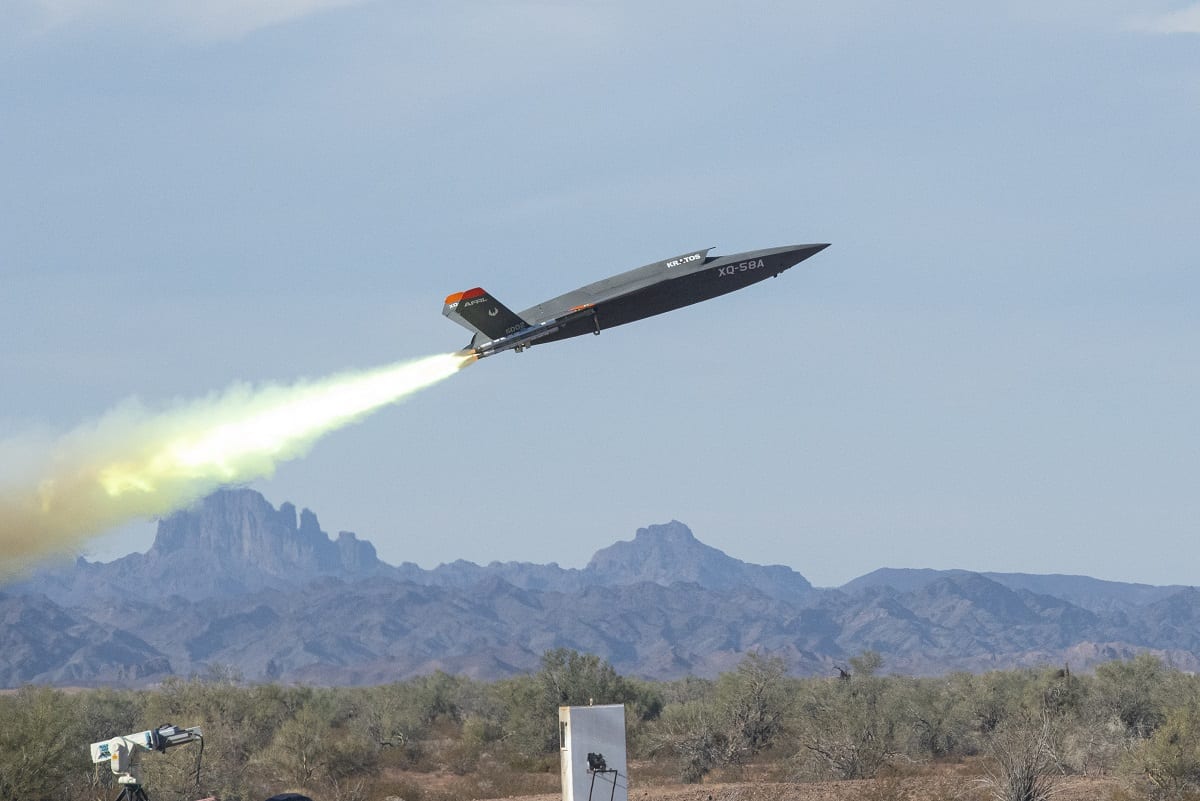
An XQ-58A Valkyrie launches at the Yuma Proving Grounds, Ariz. on Dec. 9, 2020 in the fifth launch for the drone. (US Air Force)
The Pentagon recently demonstrated autonomous, artificial intelligence (AI)-enabled tracking of mobile targets–an effort simultaneous with other such AI drone projects and DoD’s development of principles for ethical AI use, a top official said on June 22.
Last month, a memorandum from Deputy Defense Secretary Kathleen Hicks re-affirmed DoD’s commitment to such principles, and Barbara McQuiston, the acting Under Secretary of Defense for Research and Engineering (R&E), said on June 22 that Hicks’ memo “puts us on a strong foundation.”
On June 22, Deputy Defense Secretary Kathleen Hicks announced the DoD AI and Data Acceleration initiative to accelerate the development of data and AI-dependent concepts, like Joint All-Domain Command and Control, through a series of exercises. Hicks said that the Pentagon is creating operational data teams for the 11 combatant commands to automate data feeds to improve decision making.
“DoD has experience safely and securely developing, prototyping and, in some cases, operating autonomous vehicles in the air, on land, and in the sea,” McQuiston said June 22 during a DoD Artificial Intelligence Symposium.
“In the air, an R&E sponsored program built and successfully tested a developmental prototype to prove a long-range, high-performance, autonomous unmanned air system supporting both strike and ISR collection missions,” she said. “The Brilliant Effects Employment Shadow [BEES] program just completed successful testing on the Tiger Shark UAV, demonstrating the finding, fixing, tracking, and targeting of mobile targets using autonomous, unmanned aerial systems. BEES demonstrated autonomous behaviors to synchronize multiple ISR and electronic warfare platforms to responsibly find and track moving, high-value targets. This project demonstrated agile, automated manufacturing processes and developed in-house prototyping capability for low-cost, unmanned aircraft technology—proving it is possible to rapidly manufacture low-cost, combat relevant aircraft.”
The Maryland-based Navmar Applied Sciences Corp. (NASC) builds the U.S. Navy RQ-23A Tiger Shark drone, which has seen service over Iraq and Afghanistan.
“What’s really exciting is over the past couple of months, for the first time ever, at least in my experience here, we have systems in [the] experimental [stage] or in development where we’ve deployed code onto a tactical edge system that’s flying around,” Nand Mulchandani, chief technology officer for DoD’s Joint Artificial Intelligence Center (JAIC), said in a separate appearance at the June 22 DoD AI forum. “It gathers data, pulls it back to the data center. We retrain the model and are able to do a live deployment without interruption on an experimental system that’s running in a very tight loop. We are getting all the right elements together to start enabling large scale deployment of narrow AI technology across the DoD.”
BEES capabilities transitioned to the U.S. Air Force Skyborg Vanguard program, McQuiston said. On Dec. 9 last year, a Kratos [KTOS] XQ-58A Valkyrie drone enabled communications between a Lockheed Martin [LMT] F-22 and F-35B during a test despite the fighters’ incompatible data links, the Air Force has said.
“Today there are many challenges associated with AI,” McQuiston said. “We know that our potential adversaries may not apply the same principles of ethics when it comes to using AI responsibly. We live in a democracy which offers many voices and perspectives making it even more important that we have communication and partnerships supporting us into the future. The principles for developing ethical AI will put our nation on a solid, moral footing all the while providing the capabilities to deter those who would wish us harm. Our values, shared with our allies, make us stronger.”
According to a request for information released on June 22, JAIC is seeking input on the responsible use of AI by July 14.